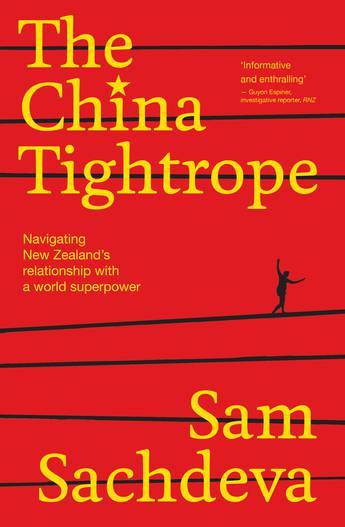
The golden days of the China-NZ relationship are well and truly over - and Kiwis need to get used to awkward conversations about our ties with the world superpower, writes Newsroom journalist and The China Tightrope author Sam Sachdeva
Last week, the New Zealand government joined its Five Eyes partners in warning of a global threat posed by China - to be more specific, by state-sponsored actors working on Beijing’s behalf.
The attackers had infiltrated critical infrastructure in the United States, but intelligence officials warned they “could apply the same techniques against these and other sectors worldwide” - New Zealand included.
A decade ago, such a declaration would have stopped our country in its tracks. Yet while the news was duly covered by a range of local outlets, the almost perfunctory nature of the reporting was a reminder of just how drastically the landscape of the New Zealand-China relationship has changed.
My newly released book, The China Tightrope, is an attempt to map that new terrain and to look ahead to what may lie in store.
READ MORE: * The China Tightrope: War on our doorstep? * Hong Kong, c/- China
Attempting such topography was a difficult task in several respects. Beyond the practical elements of how to research and write a book while still working full-time (the solution: industrial amounts of caffeine and an incredibly understanding employer), there was the constantly shifting geopolitical picture to contend with.
Since I first started working on the manuscript in late 2021, we have seen a Russian invasion of Ukraine, a diplomatic trip to Taiwan that threatened to spark a wider conflict, and the shooting down of an alleged Chinese spy balloon off the American coast - not to mention a change of Prime Minister on our own shores. Yet for all that the earth has continued to move, one thing has remained constant: managing our relationship with the Asian superpower is only becoming more difficult, not less so.
When I spoke to Sir John Key for The China Tightrope, the former Prime Minister argued that New Zealand has long had to balance human rights concerns against trade benefits. That is partly true - but Tibet and Taiwan have been joined by Hong Kong, Xinjiang and other locations where Beijing’s behaviour has required a response from our politicians. The country’s military buildup has also expanded outwards, beyond artificial islands in the South China Sea to aspirations of defence and security pacts in far-flung parts of the world - including, crucially, the Pacific Islands.
The growing threat of foreign interference from the Chinese state is also very real, as the politicians, academics and Chinese community members who I spoke to for the book were all too willing to testify. Some of Beijing's supporters argue that criticisms of the Chinese Communist Party are rooted in racism, but while there is a very real need to speak about our concerns with an abundance of caution, to put such critiques off-limits would be to betray the Chinese Kiwis who deserve the right to exercise their own freedoms in Aotearoa without fear of retribution.

None of this is to say that we should cut ties with China, or be drawn into a fatalistic view that a war is an inevitability. A military conflict would have devastating consequences for both the direct combatants and the wider world, while global problems like climate change cannot be addressed without the inclusion of a country boasting a population of more than 1.4 billion people.
But the idea that concern about Chinese aggression is solely the preserve of Western nations seeking to maintain their historical hegemony ignores the fact that India, Japan, South Korea and myriad other Asian nations are also overhauling their foreign policy and defence arrangements out of fear at where Beijing's actions may lead.
That New Zealand is taking defensive actions of its own does not have to mean we are blindly falling in line with the US - simply that we are prepared to assess what is in our own national interest and act accordingly, whether in concert with other nations or on our own if necessary.
Many of the potential policy solutions put to me by those I interviewed for The China Tightrope will protect us from the inappropriate behaviour of any other country, not just China - from ensuring our exports are not so heavily concentrated into any one country, to political donations reform and stronger oversight of foreign-language media.
Moving ahead with that work does require us as a country to accept that the golden days of the New Zealand-China relationship are over, and that we cannot reap the rewards of trade without dealing with the knottier issues associated with an authoritarian regime. It is a change of mindset that most of us are already adapting to, albeit some more readily than others.
There are no easy answers, but having a more open and honest conversation is a start.
Sam Sachdeva is Newsroom's national affairs editor and author of The China Tightrope, a book about the changing NZ-China relationship published on May 30 by Allen & Unwin. The book can be bought at Whitcoulls, Paper Plus and Good Books, or from your local bookstore.







